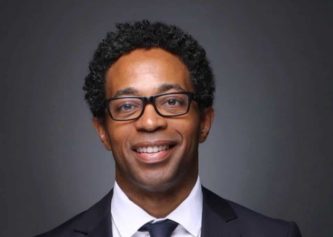By Anthony T. Browder
This is a tale of two countries and their treatment of two African-American men named Michael Brown. This is also a tale about the best of times and the worst of times in the lives of both Michael Browns and perceptions of value.
On Aug. 1, Michael Brown traveled to Egypt, along with 23 other people who were participating in one of my annual study tours of ancient Egypt. Michael and I met 34 years ago on our first trip to Egypt, and we have been close friends ever since.
Michael Brown is a phenomenal painter and sculptor, who is probably best known for designing the official posters for the Million Man March, the Million Woman March and the Million Family March.
This was Michael’s second trip to Egypt, and he was accompanied by his 9-year-old daughter Nailah. This was my 50th trip to Egypt, and I was accompanied by my 31-year-old daughter Atlantis, who was making her eighth trip to Egypt.
Atlantis was 7 when she first traveled to Egypt, and we documented her journey in a book titled My First Trip to Africa, which was published in 1990. Michael had little Nailah journal throughout her trip with the hope that she also would write a book about her experiences along the Nile.
During our three-week stay in Egypt, we visited dozens of ancient sites, attended nightly lectures and participated in an archeological dig. As our days and nights left us without any spare time, we were unaware of the recent murder of 18-year-old Michael Brown in Ferguson, Missouri, and the ensuing civil unrest and protests of anger and frustration that took place throughout the United States.
Once news of the tragic murder of Michael Brown spread among members of our group in Egypt, we began discussing the differences between how African-Americans were treated back home and the treatment we were receiving in Egypt.
The differences were startling.
According to MSNBC host Melissa Harris-Perry, a Black man is killed in America by a police officer every 28 hours. She began her Aug. 16 show reading a list of some of the recent murders of Black men that have received national attention.
The senseless murder of over 6,000 Black men by police officers, between 2006 and 2012, strongly suggests that American society places little value on the lives of Black men. Every one of us knew that if the circumstances were reversed, and white males were killed by Black officers at such high numbers, it would be declared a national crisis.
In stark contrast, the Egyptian government ensured our safety by providing an armed security officer on our bus during our daily excursions. And whenever we drove long distances, we had a police escort to ensure our safety as we traveled from jurisdiction to jurisdiction.
The Egyptian government clearly demonstrated concern for our safety not just because we were U.S. citizens, but because they knew that African-Americans spend more money in Egypt than any other tourists. The Egyptians knew our value and oftentimes went out of their way to protect their interests.
Tourism is the No. 1 income generator in Egypt and has dropped 54 percent since the revolutions of 2011 and 2013. Tourism dollars have declined from a high of $11 billion in 2008 to $6 billion last year, and the loss of income has been felt nationwide. As a result, the Egyptian government and business community are compelled to ensure our safety because their livelihood depends on us feeling safe and secure.
This recent trip demonstrated what I have known for decades – that I am valued more in Egypt than I am in my own country. As an African-American male, I also realize that I am safer in Egypt than I am in America.
I am often asked by friends if I fear for my safety while traveling in Egypt, and my response is always an emphatic “NO!”
I was asked that question while attending a funeral in my hometown of Chicago last July. During my brief stay in “Chi-raq” (as the city is often called), the lead story on the daily news and newspapers recounted the 82 people who were shot over the holiday weekend between July 4 – 7.
Of the 82 shooting victims, 15 were killed (mostly males) and all of the victims were Black and brown and were shot by their own kind.
The question on the minds of everyone who pondered these senseless killings was, “What’s wrong with Black people?”
One simple answer to this very complex question is that any people who have been socialized to hate themselves often see themselves as having little value. Such people are often more inclined to engage in risky behavior and aggress against people who look like them.
Such people will find more value in material possessions of depreciating value than investing in a quality education that will benefit future generations. A people with such shortsightedness will often inflict long-term pain and suffering on themselves, their families and their communities and, before long, begin to believe that such behavior is normal.
I have discovered an antidote to this seemingly intractable problem – constant engagement in the process of “retroactive remembrances.” There is power in studying your history and knowing yourself.
My travels to Africa, particularly Egypt, have provided me with more knowledge than I learned in any classroom in America. The people who travel to Egypt with me are able to see evidence of the grand accomplishments of African people, thousands of years before the development of language, culture or civilization in ancient Greece or Rome. We learn what we were never taught in schools in the U.S. We learn that Egypt is in Africa and indigenous African people developed that ancient country before she was conquered by Europeans or Arabs. African-American witnesses to these profound historical truths are forever transformed and return home with a renewed spirit and confidence.
If these experiences could be shared with more African-American youths, I am sure it will make a profound difference in their lives and the lives of their siblings and friends. I have seen the proof in a Philadelphia-based program called African Genesis. African-Americans, between the ages of 10 and 16, are engaged in a two-year study course of African history. Those who successfully complete the Saturday afternoon sessions are rewarded with a free trip to Egypt.
The African Genesis Institute has taken over 3,000 young people (and 2,000 chaperones) to Egypt over the past decade. They have documented improved classroom performance in over 80 percent of the students who complete the program. Sadly, such stories of pride and triumph seldom receive local or national exposure.
Unfortunately, we live in a society where death trumps life and the mantra among news organizations is, “If it bleeds, it leads.” While we may not be able to protect every African-American youth from violence, I do know that adults can save more young people by teaching them their history and taking them on a journey to the motherland. Such endeavors help them see the greatness within themselves and reflect that greatness in their surroundings upon returning home.
But it’s difficult for adults to teach what they don’t know. I always encourage adults to get off Facebook and get their faces in a book. I encourage them to read books of substance and model for youths how socially conscious people should conduct themselves if they desire to change their circumstances and live productive lives. This is not a fantasy or wishful thinking, this is how every successful American has transformed their lives.
That is what I have done with my daughter. That is what Michael Brown did with his daughter this summer. And that is what African Genesis has done with thousands of sons and daughters for over a decade. This is not rocket science – this is a proven scientific fact.
When we value ourselves, we change the way we think, speak and act, and this changes the way others perceive and respond to us. Such changes happen regularly for Black folk who travel to Egypt, and it would be a life-saving game changer if it happened more regularly in our homes and throughout our country.
This is a change worth believing in and living for.
–––––––––––––––––––––––––––––––––––––––––––––––––––––––––––––––––––––––––––––––––––––––––––––––––––––––––––
Information on Anthony Browder’s study tours and publications can be found at www.ikg-info.com
Information on Michael Brown’s art can be found at www.michaelanthonybrown.com
The African Genesis Institute can be contacted at [email protected]


